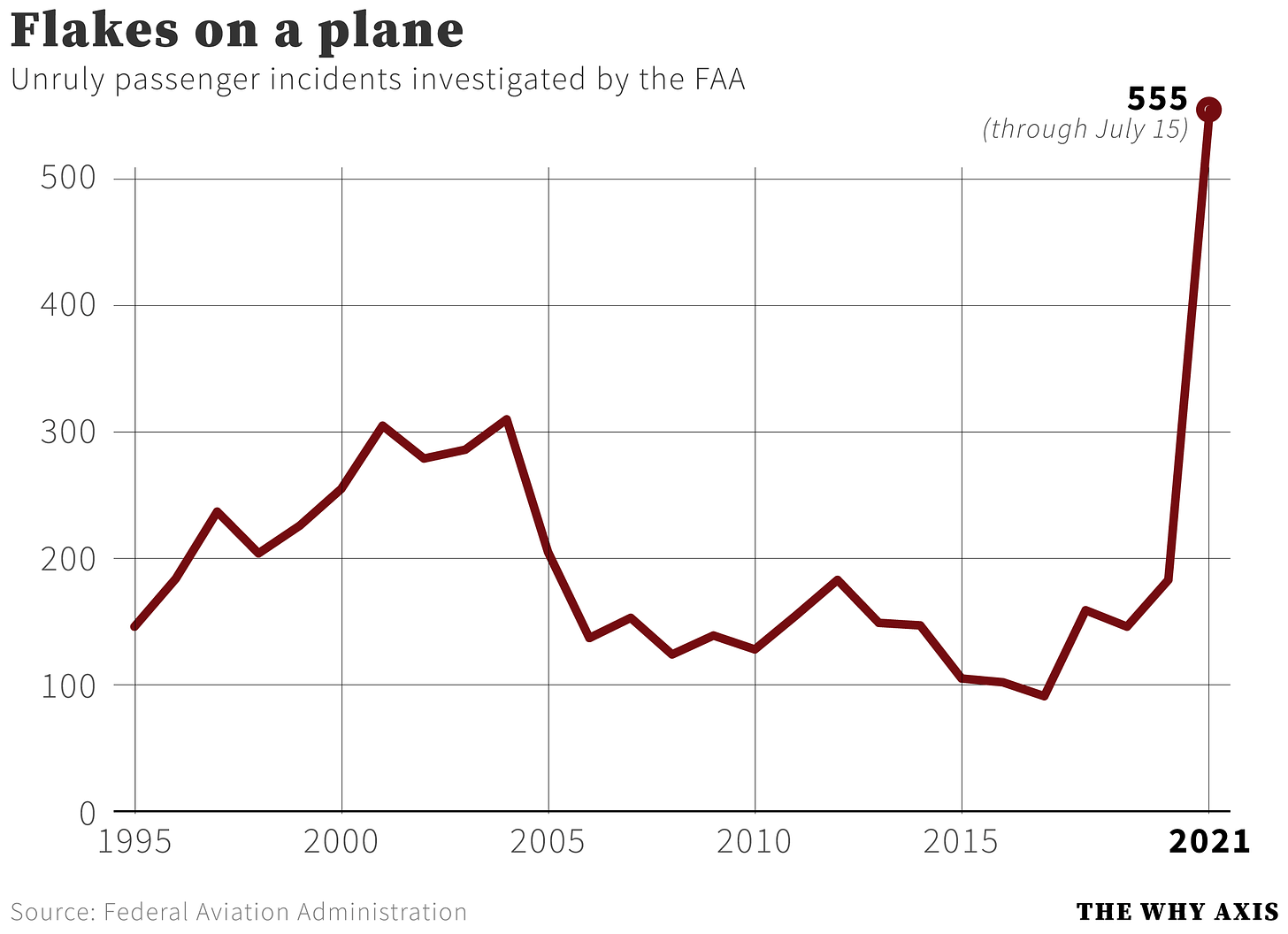
People are losing their minds on airplanes.
Consider this data from the Federal Aviation Administration: pre-pandemic, the FAA undertook an average of 182 investigations into “unruly passenger” behavior annually. These are incidents where passengers — often, but not always, drunk ones — interfere with the duties of the flight crew. This could include fighting flight attendants, or biting them, or trying to open the cabin door in flight, or just generally being an belligerent asshole in a way that puts the crew and all the other passengers in danger.
In 2021 so far — a year that’s just a hair over halfway done — the FAA’s had to investigate 555 such incidents. That puts us on pace to hit well over 1,000 unruly passenger cases by the end of the year. The implication is that American flyers in 2021 are five times more unruly than usual — a 400% increase in unruliness!
What is going on? Let’s take a look at the most recent batch of civil fines issued by the FAA in these investigations, which include helpful narrative descriptions of the offending behavior. See if you detect any similarities:
A Frontier Airlines passenger got drunk, refused to wear a mask, and began fighting with the flight attendant and other nearby passengers.
A Republic Airlines passenger refused to wear a mask and, when being escorted off the plane, punched the passenger in front of her in the back of the head.
A Frontier Airlines passenger refused to wear a mask and wandered about the cabin during the final descent.
A Frontier Airlines passenger got drunk and repeatedly removed her facemask and refused to wear it properly when it was on.
The FAA report goes on and on like this. So, yeah: it’s the masks (also now that I’ve written it all out, it looks like this stuff is disproportionately happening on budget airlines? Sounds like potential fodder for a future piece, I’ll get back to you guys on that). People are so worked up over basic public health measures that they’re throwing tantrums on airplanes and getting booted off of them, incurring tens of thousands of dollars in fines in the process. The FAA says that a whopping 75 percent of unruly passenger reports this year are linked to masks.
It’s worth noting that the data in the chart above likely understate the magnitude of the problem. If a person is being a jerk on a plane, a member of the flight crew can submit a report to the FAA. Reports that show signs of a clear violation of federal regulations result in the investigations that are plotted above. The 555 investigations this year are just a subset of the more than 3,400 reports submitted to authorities.
One other bit of important context: there are roughly 45,000 U.S. flights every day, ferrying nearly 3 million passengers according to the FAA. Even at these elevated levels, only something like 0.0006 percent of passengers this year have behaved badly enough to get a report filed on them. The overwhelming majority of passengers are being good! Still, if you’re a member of a flight crew on the front lines of these incidents, one punch to the face from a belligerent anti-masker is way too many.
My hunch is that these cases disproportionately involve die-hard Trump supporters, because Trump support is one of the major drivers of attitudes toward masks in the U.S. (As always, never forget that this is a world-historic public health failure that in a sane country would have resulted in the guy being banished from public life forever. We are not a sane country). Alas, the FAA does not collect data on the partisan loyalties of people kicked off America’s planes so that’ll have to remain a hunch for the time being.
The FAA, bless their hearts, are trying their best to tackle this whole issue. They’ve released a Zero Tolerance for Unruly and Dangerous Behavior Toolkit, which appears to consist primarily of a video PSA and, uh, memes? Most of the memes, to be honest, could benefit from some workshopping. But I’m kind of fond of this one, just for the utter chaos of it.
In other news, I just don’t know how to quit the Washington Post
The nice folks at the Outlook desk over there invited me to do a piece for them on five big myths surrounding marijuana use and legalization. I’ve excerpted one of them below but I encourage you to go read the whole thing!
Myth: Legalization has been a public health disaster.
Opponents of legalization often make their case in apocalyptic terms. Groups like Parents Opposed to Pot, for instance, claim that legalization is “an anti-science Public Health disaster” and an “assault on public safety” that “increases the black market for all drugs, and overdose deaths,” and that “on EVERY measure, marijuana legalization is failed policy.” Medical groups have argued that legalization will lead to increases in teen drug use. Police groups have warned that traffic fatalities will rise.
But one of the most striking facts about the states that have legalized is how little has changed there. This spring, for instance, two economists from the University of Colorado at Denver and Montana State University performed a comprehensive review of the public health consequences of marijuana legalization, encompassing dozens of previously published studies. They found little evidence suggesting that recreational marijuana laws result in greater teen drug use, but strong evidence that teens who do use marijuana are less likely to use alcohol — a net public health win, given what we know about the relative dangers of the two substances. There are also some provisional signs that legal weed is taking a bite out of opioid mortality, directly contradicting prohibitionists’ dire warnings.
On the traffic front, the researchers found that “road safety improves when medical marijuana is legalized” but that the jury’s still out on the effect specifically of recreational pot. At the workplace, multiple studies have shown that legalization reduces sick-day use and absenteeism.
The net post-legalization changes are modest and trending slightly toward positive. This is not terribly surprising: Human societies are massive and complex systems, with thousands of interconnected parts interacting in unpredictable ways. It’s naive to think that altering a single variable, like the legal status of weed, could bring the whole edifice crashing down.




